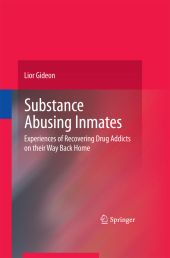 Neuerscheinungen 2014Stand: 2020-02-01 |
Schnellsuche
ISBN/Stichwort/Autor
|
Herderstraße 10
10625 Berlin
Tel.: 030 315 714 16
Fax 030 315 714 14
info@buchspektrum.de |

Lior Gideon
Substance Abusing Inmates
Experiences of Recovering Drug Addicts on their Way Back Home
2010. 2014. xix, 165 S. 235 mm
Verlag/Jahr: SPRINGER, BERLIN; SPRINGER NEW YORK; SPRINGER 2014
ISBN: 1-489-98521-2 (1489985212)
Neue ISBN: 978-1-489-98521-7 (9781489985217)
Preis und Lieferzeit: Bitte klicken
The product of an original study that followed inmates who participated in a prison-based therapeutic community, this book describes the challenges faced by rehabilitated addicts and their journey to freedom - from drugs as well as further criminal activity.
In a manner similar to asking an immigrant to describe his/her first few months, and even their first year, in the country they migrate to, asking released inmates how they reform their lives is the key to unlocking their individual Pandora Box. Anyone who ever went through the migration process experienced many of the same difficulties encountered by those who are released from incarceration and try to rehabilitate their life.
There are more than nine million people imprisoned worldwide, and it is known that the majority of them will be released back to the community. Currently, in the United States there are about 700,000 people reentering society after serving time in state and federal prisons. These numbers are much higher for jail inmates who are estimated by the millions each year. Considering the fact that more than two thirds of offenders sentenced to jails and prisons have histories of substance abuse, reentry and reintegration practices become even more of a challenge.
This book is a product of an original study that examined inmates who participated in a prison-based therapeutic community and were followed for up to seven years after their release. It will describe the challenges faced by rehabilitated addicts who were released from a prison-based therapeutic community and their journey to freedom; freedom from drugs and freedom from further involvement in criminal activity.
Introduction: Reintegration and Migration Chapter One: Theoretical Framework
Social Background Life-style Exposure and Routine Activity Differential Association Theory Social Bonding and Social Control Social Support Networks Discussion and Summary Chapter Two: The Study and Methodology The Interview Method Participants Sampling The Interviewing Process Chapter Three: There is no Place Like Home - Family Role in the Rehabilitation and Reintegration process. Family Criminal Activity and Drug Relapse The Causes of Criminality and Addiction Family Support and Assistance Spousal Role in Rehabilitation: The Need for Mutual Treatment Lack of Trust Discussion and Summary Chapter Four: Sense of Direction - The Need for Supervision Control and Supervision Continuum of Treatment and Outside Supervision After Release Community Supervision - Incentive or Leash? Discussion and Summary Chapter Five: What Do I Need to Succeed? Perception of Motivation and its Role in the Rehabilitation Process. Motivation to Change and Self-Efficacy Not Only Talking but Lots of Walking Doing it on My Own Discussion and Summary Chapter Six: Working My Way Out - the Challenge of Finding a Job Financial Problems The Importance of Employment in the Rehabilitation Process What have I Got to Offer? Trust Issues Discussion and Summary Chapter Seven: Dealing with Social Institutions From the Belly of the Beast to the Belly of Bureaucracy Lost in the Process Absorption Agents and Social Support - Can Someone Show Me the Way? Discussion andSummary Chapter Eight: Mentoring Others Been There Done That... Preaching the Practice Giving and Receiving Commitment - Being a Role Model Discussion and Summary Chapter Nine: What Does Migration have to do with Rehabilitation, Reintegration and Reentry? Same Story Different Players The Struggle to Survive Discussion and Summary Chapter Ten: Conclusion - Reintegration and Continuum of Care Study Limitations


